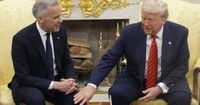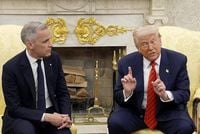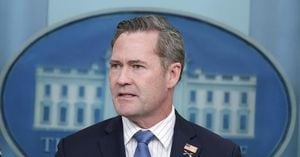In a bid to strengthen Canada’s economic resilience amid ongoing trade tensions, Prime Minister Mark Carney will meet with the country’s premiers in Saskatoon on June 2, 2025. This meeting comes on the heels of Carney’s first encounter with U.S. President Donald Trump, where discussions centered around tariffs and the future of Canada-U.S. relations.
On May 7, Carney briefed the premiers on his meeting with Trump, where he faced considerable challenges, including navigating Trump’s disparaging remarks about Canadian officials. Trump referred to Chrystia Freeland, Canada’s minister of transport and internal trade, as a "terrible person" during their discussions, a comment that has drawn criticism from Canadian political observers.
Ontario Premier Doug Ford praised Carney for his restraint during the meeting, stating, "I don’t think I’d have the restraint that he had yesterday, to be very frank. I think it’s a good start on a new relationship." Ford’s sentiments were echoed by Saskatchewan Premier Scott Moe, who expressed optimism following Carney’s meeting with Trump, indicating that robust discussions are needed to unite Canadians during a divisive political climate.
The Prime Minister’s Office characterized the May 7 conference call as "productive," with a focus on the Canada-U.S. relationship and reinforcing Canada’s strength at home. The premiers agreed to accelerate project approvals through a "one project, one review" approach, and Carney reaffirmed his commitment to table federal legislation aimed at eliminating internal trade barriers by Canada Day.
New Brunswick Premier Susan Holt emphasized the importance of nation-building projects, highlighting her province's readiness to enhance national trade through investments in critical minerals and modular home building. "We are ready to tap into investments to tackle the national housing crisis," Holt stated.
Meanwhile, Alberta Premier Danielle Smith has stirred controversy by proposing legislation that would lower the threshold for initiating a referendum on secession from Canada. Ford criticized this move, asserting that this is a time to unite against external pressures, particularly from the United States. "This is a time to unite the country, not people saying, ‘Oh, I’m leaving the country,’" he remarked.
During his two-hour meeting with Trump, Carney pressed for the dismantling of tariffs on Canadian goods, a crucial point for any new trading arrangement. Trump acknowledged the discussions were "great" but maintained that tariffs would not be lifted immediately. Carney’s delegation left the meeting with a clearer understanding of Trump’s annexationist sentiments, which Carney firmly rejected.
Carney also addressed the opioid crisis during discussions, pointing out that Canada is not a major source of fentanyl, despite the ongoing opioid toxicity deaths that have plagued the country since 2016. The latest figures indicate that Canada has seen 50,928 apparent opioid toxicity deaths since 2016, a statistic that underscores the urgency of addressing drug-related issues collaboratively.
In addition to trade and tariffs, the premiers discussed various other pressing issues, including the film industry and the softwood lumber sector. Eby noted that there’s a growing consensus among timber-producing provinces for a potential agreement with the U.S. regarding softwood lumber, which could lead to significant financial benefits for both countries.
As the premiers prepare for the upcoming Saskatoon meeting, they are also mindful of the broader implications of their discussions with Trump. The stakes are high, given the looming review of the Canada-U.S.-Mexico Agreement (CUSMA) scheduled for 2026, with Trump indicating a desire to reopen negotiations sooner.
Political experts suggest that Carney will need to navigate a complex landscape of negotiations, balancing immediate tariff issues with longer-term trade agreements. Fen Hampson, a professor at Carleton University, emphasized that the prime minister must select cabinet members who are not only skilled managers but also adept negotiators.
In the face of these challenges, Carney remains committed to fostering a unified Canadian front. He is expected to name a new cabinet soon, ahead of Parliament’s return at the end of the month. As he prepares for the G7 leaders’ summit in Alberta from June 15 to 17, the prime minister’s ability to build a cohesive strategy will be crucial.
With the premiers’ meeting in Saskatoon approaching, the focus will be on collaborative efforts to bolster Canada’s economy and address the pressing issues that threaten national unity. The path forward may be fraught with challenges, but the commitment to a united Canada remains steadfast as leaders work together to navigate the complexities of international relations and domestic priorities.





